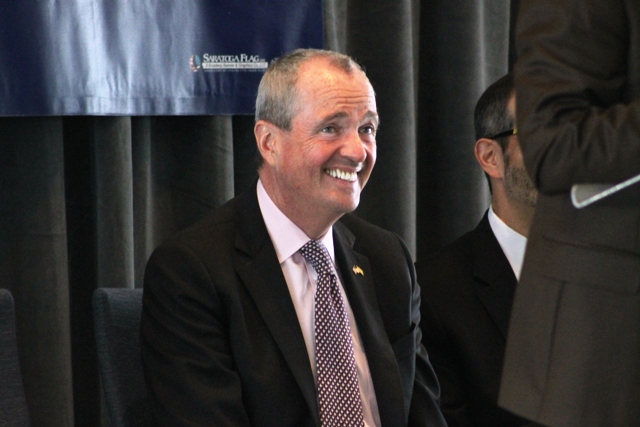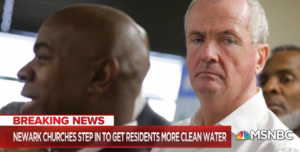Monmouth Poll: Governor Murphy has a 41% Job Approval Rating

Not much has changed in Gov. Phil Murphy’s ratings since the Monmouth University Poll last checked at the beginning of the year. He earns a split decision on his job performance and is seen as being more concerned with his own political future rather than running the state. Public opinion tends to be more negative than positive about the impact of Murphy’s agenda on property tax payers and the middle class. The governor gets mixed reviews on his handling of the Newark water crisis, although most Garden State residents don’t have an opinion or are unaware of the issue.
Currently, 41% of New Jerseyans approve of the job Murphy is doing as governor and 38% disapprove. These results are statistically similar to the 43% approve and 40% disapprove rating he earned in February 2019. In April 2018, shortly after he took office, his approval rating was similar at 44%, while his disapproval rating was lower at 28%.
[caption id="attachment_64634" align="alignnone" width="1080"] Corzine and Christie earlier this year with South Jersey Democratic Party Power Broker George Norcross III.[/caption]
Corzine and Christie earlier this year with South Jersey Democratic Party Power Broker George Norcross III.[/caption]
Murphy’s rating continues to be less positive than his two immediate predecessors at approximately the same point in their terms. An August 2011 Monmouth poll gave then-Gov. Chris Christie a 48% approve to 42% disapprove rating and one taken in October 2011 gave the Republican an even better 54% approve and 38% disapprove rating. Christie’s predecessor, Democratic Gov. Jon Corzine, received a 46% approve and 32% disapprove rating in September 2007. Murphy’s standing at this point is about the same as former Democratic Gov. Jim McGreevey, who received a 38% approve and 40% disapprove rating in a September 2003 Eagleton poll.
[caption id="attachment_1460" align="alignleft" width="300"] From left: Essex Freeholder Len Luciano, Belmar Mayor Matt Doherty, and former Governor James McGreevey.[/caption]
From left: Essex Freeholder Len Luciano, Belmar Mayor Matt Doherty, and former Governor James McGreevey.[/caption]
Just over 1-in-5 New Jerseyans (21%) have no opinion of how Murphy is doing 20 months into his term, which is similar to his two Democratic predecessors (Corzine 22% and McGreevey 22%) but higher than for Christie at the same point (9%). Murphy currently earns a positive 71% approve and 11% disapprove rating among Democrats, but gets a negative 28% approve and 49% disapprove rating among independents, and a 16% approve and 67% disapprove rating among Republicans.
“Murphy’s approval rating has been stuck at a nearly even split this year. Recent events, such as the Newark water crisis, have not helped cast him in the best light. But the bigger issue seems to be that he is simply flying under the radar for most New Jerseyans,” said Patrick Murray, director of the independent Monmouth University Polling Institute.
The governor gets more negative than positive reviews for his handling of the recent drinking water
[caption id="attachment_62390" align="alignright" width="300"] Governor Phil Murphy addressed lead contamination in Newark's water supply on MSNBC, calling it a 'public health challenge'[/caption]
Governor Phil Murphy addressed lead contamination in Newark's water supply on MSNBC, calling it a 'public health challenge'[/caption]
crisis in Newark, but most of the state registers no opinion. Just 10% approve of Murphy’s handling of the lead contamination issue in the state’s largest city while 28% disapprove. However, 41% have no opinion of how he has handled this problem and 21% have not heard anything about this issue. Even among his fellow Democrats statewide, Murphy’s actions earn a net negative assessment (18% approve and 27% disapprove, with 37% having no opinion). Among New Jerseyans who have heard a lot about the Newark crisis – a group that represents just under half of all state residents – Murphy gets a decidedly more negative 19% approve and 41% disapprove rating for his handling of the problem, with 41% having no opinion. Among residents of the state’s urban core counties of Essex and Hudson – those who live closest to Newark and are the most aware of the problem – Murphy’s handling of the matter earns a 12% approve and 44% disapprove rating with just 29% offering no opinion.
“The fact that this crisis happened in the part of New Jersey where Murphy’s strongest partisan base lives has not helped the governor’s overall standing,” said Murray.
Just over 1-in-10 New Jerseyans (12%) say Murphy has achieved major accomplishments so far and 42% say he has minor accomplishments. Another 36% say he has no real accomplishments and 10% offer no opinion. Democrats (21% major and 55% minor) are more likely than either independents (8% major and 39% minor) or Republicans (4% major and 28% minor) to say that the governor has some accomplishments in his term. This view is similar to how McGreevey was seen at the same point in his term (11% major, 45% minor, 32% none, 12% no opinion in September 2003) and how Corzine was seen toward the end of his term (13% major, 49% minor, 34% none, 4% no opinion in July 2009). Murphy’s immediate predecessor, Christie, was seen as having accomplished more major agenda items at this point in his term (24% major, 40% minor, 34% none, 3% no opinion in August 2011).
“At this point in his term, Christie had made a big splash with pension reform and his approval ratings were clearly on the rise. Murphy does not have anything similarly flashy that has made New Jerseyans sit up and take notice. However, Christie may be the exception rather than the rule for New Jersey governors,” said Murray.
New Jerseyans tend to feel that Murphy is more concerned with his own political future (49%) than he is
[caption id="attachment_64190" align="alignright" width="300"] Last week's presidential debate, the ultimate outcome of which could possibly decide Murphy's political fate.[/caption]
Last week's presidential debate, the ultimate outcome of which could possibly decide Murphy's political fate.[/caption]
with governing the state (33%). Another 4% say he is concerned with both equally and 15% are unsure where his focus lies. These results are very similar to public opinion earlier this year, when 46% said Murphy was more focused on his future and 33% said he was more focused on the state. This perception was evenly divided in April 2018, though, at 39% more concerned with his own future and 40% more concerned with governing the state.
[caption id="attachment_58854" align="alignleft" width="300"] Senate President Steve Sweeney and NJ Realtors[/caption]
Senate President Steve Sweeney and NJ Realtors[/caption]
The poll also found that the governor’s relationship with his own party’s legislative leadership is seen as slightly more negative now than it was earlier this year, but a majority of the public still isn’t paying attention. Currently, 14% say Murphy has a good relationship with top Democrats in the legislature, which is down from 20% in February. On the other hand, 28% say he has a bad relationship with these leaders, which is up from 19% earlier this year. Still, 53% say they have not heard anything about this relationship which is similar to 54% who were unaware in February. Currently, the state legislature as a whole receives a 33% approve and 42% disapprove rating from New Jersey residents, which is similar to prior results for the legislature since Murphy took office.
“This Trenton battle continues to be mainly political insider stuff, but the impression of a toxic relationship between the state’s chief executive and its legislative leadership does appear to be slowly seeping into the public,” said Murray.
Murphy continues to get mixed reviews for how he has helped New Jerseyans across the economic spectrum. While 25% say his policies have helped the poor, a similar 21% say they have actually hurt this group and 32% say they have had no impact. Murphy’s policies have been seen as slightly more positive for wealthy residents – 27% say this group has been helped and 14% say it has been hurt, with 31% saying there has been no impact. The governor gets more negative reviews for his impact on middle class New Jerseyans – 17% of the public say helped and 31% say hurt, with 36% saying no impact.
The number who say Murphy’s policies have hurt all three of these income groups has actually gone down by 7 to 8 points since February. This change has mainly been due to some Republicans shifting from the “hurt” category to “no impact.” The number of state residents who say Murphy’s policies have helped the poor and middle class has remained stable (down just 1 to 2 points for these groups), but the number who say he has helped wealthy residents has gone up by 5 points.
“These shifts are small and need to be taken with a grain of salt, but it seems that Republicans have become less worried about Murphy’s economic policies while Democrats feel that the wealthy are the group making gains. This runs counter to the ‘liberal lion’ image the governor is trying to foster. It could be problematic for his brand if this trend is confirmed in future polls,” said Murray.
The poll also finds that few New Jerseyans feel property tax payers have benefited from Murphy’s time as governor at 10% helped and 39% hurt, with 33% saying no impact. Opinion is mixed for transit riders – 16% say they have been helped by Murphy’s policies, 18% say they have been hurt, and 29% offer no opinion. The poll also finds a split decision for the administration’s impact on businesses in the state – 23% helped, 26% hurt, and 26% no impact. For each of these three groups, the percentage who say “helped” has gone up by 2 to 4 points while the number who say “hurt” has declined by 7 to 9 points.
Monmouth University conducted the poll by telephone from September 12 to 16, 2019 with 713 New Jersey adults. The question results in this release have a margin of error of +/- 3.7 percentage points. The poll was conducted by the Monmouth University Polling Institute in West Long Branch.
QUESTIONS AND RESULTS
(* Some columns may not add to 100% due to rounding.)
[Q1 held for future release.]
2. Do you approve or disapprove of the job Phil Murphy is doing as governor?
TREND: All adults |
Sept. |
Feb. |
April |
|
Approve |
41% |
43% |
44% |
|
Disapprove |
38% |
40% |
28% |
|
(VOL) No opinion |
21% |
17% |
28% |
|
(n) |
(713) |
(604) |
(703) |
TREND: Registered voters |
Sept. |
Feb. |
April |
|
Approve |
40% |
42% |
43% |
|
Disapprove |
41% |
43% |
30% |
|
(VOL) No opinion |
19% |
16% |
27% |
|
(n) |
(651) |
(549) |
(632) |
3. Do you approve or disapprove of the job the state legislature is doing?
TREND: All adults |
Sept. |
Feb. |
April |
|
Approve |
33% |
37% |
36% |
|
Disapprove |
42% |
42% |
39% |
|
(VOL) No opinion |
25% |
21% |
24% |
|
(n) |
(713) |
(604) |
(703) |
|
TREND: Registered voters |
Sept. |
Feb. |
April |
July 2017 |
May |
July |
May |
Feb. |
Sept. |
June |
April |
Feb. |
Jan. |
|
Approve |
32% |
35% |
34% |
23% |
29% |
32% |
33% |
37% |
35% |
36% |
38% |
38% |
47% |
|
Disapprove |
45% |
45% |
42% |
62% |
53% |
51% |
48% |
46% |
46% |
48% |
46% |
47% |
35% |
|
(VOL) No opinion |
22% |
20% |
24% |
15% |
19% |
17% |
19% |
17% |
19% |
17% |
15% |
14% |
18% |
|
(n) |
(651) |
(549) |
(632) |
(758) |
(703) |
(453) |
(441) |
(712) |
(680) |
(717) |
(690) |
(690) |
(470) |
|
TREND: Registered voters |
Dec. |
Sept. |
April |
Feb. |
Dec. |
Sept. |
July |
April |
Feb. |
Oct. |
Aug. |
May |
Feb. |
Sept. |
July |
April |
Feb. |
|
Approve |
44% |
38% |
41% |
40% |
69% |
55% |
53% |
50% |
55% |
55% |
50% |
46% |
49% |
44% |
45% |
42% |
31% |
|
Disapprove |
38% |
36% |
42% |
35% |
22% |
36% |
35% |
38% |
37% |
37% |
41% |
49% |
41% |
40% |
43% |
44% |
15% |
|
(VOL) No opinion |
19% |
27% |
17% |
25% |
9% |
10% |
12% |
12% |
9% |
8% |
8% |
5% |
9% |
16% |
12% |
13% |
53% |
|
(n) |
(698) |
(674) |
(694) |
(697) |
(726) |
(715) |
(678) |
(692) |
(709) |
(693) |
(730) |
(725) |
(718) |
(726) |
(747) |
(719) |
(716) |
|
TREND: Registered voters |
July |
Feb. |
Sept. |
July |
April |
March |
Oct. |
Feb. |
|
Approve |
31% |
23% |
29% |
27% |
28% |
25% |
32% |
34% |
|
Disapprove |
48% |
55% |
50% |
47% |
55% |
53% |
43% |
42% |
|
(VOL) No opinion |
22% |
22% |
21% |
26% |
17% |
22% |
25% |
23% |
|
(n) |
(792) |
(721) |
(709) |
(889) |
(720) |
(719) |
(688) |
(681) |
[Q4-6 held for future release.]
7. Do you think Phil Murphy is more concerned with governing the state of New Jersey or more concerned about his own political future? [CHOICES WERE ROTATED]
|
TREND: |
Sept. |
Feb. |
April |
|
Governing the state of NJ |
33% |
33% |
40% |
|
His own political future |
49% |
46% |
39% |
|
(VOL) Both equally |
4% |
4% |
3% |
|
(VOL) Don’t know |
15% |
16% |
18% |
|
(n) |
(713) |
(604) |
(703) |
8. As far as you know, do Governor Murphy and the Democratic leaders in the legislature have a good or bad working relationship, or haven’t you heard anything about this?
|
|
Sept. |
Feb. |
|
Good relationship |
14% |
20% |
|
Bad relationship |
28% |
19% |
|
Not heard anything |
53% |
54% |
|
(VOL) Don’t know |
6% |
7% |
|
(n) |
(713) |
(604) |
9. Thinking about Phil Murphy’s term as governor so far, would you say that he has major accomplishments, minor accomplishments, or no real accomplishments to point to?
|
|
Sept. |
|
Major accomplishments |
12% |
|
Minor accomplishments |
42% |
|
No real accomplishments |
36% |
|
(VOL) Don’t know |
10% |
|
(n) |
(713) |
10. I’d like to get your opinion on how Governor Murphy’s policies have affected different groups of New Jerseyans. Have his policies helped, hurt, or had no impact on [READ ITEM]?
[ITEMS WERE ROTATED] [Note: In April 2018, poll question asked “how Governor Murphy’s policies will affect different groups…”]
Middle class residents
|
TREND: |
Sept. |
Feb. |
April |
|
Helped |
17% |
18% |
26% |
|
Hurt |
31% |
39% |
41% |
|
No impact |
36% |
27% |
17% |
|
(VOL) Both helped and hurt |
2% |
1% |
2% |
|
(VOL) Don’t know |
14% |
15% |
14% |
|
(n) |
(713) |
(604) |
(703) |
Poor residents
|
TREND: |
Sept. |
Feb. |
April |
|
Helped |
25% |
27% |
38% |
|
Hurt |
21% |
28% |
29% |
|
No impact |
32% |
27% |
14% |
|
(VOL) Both helped and hurt |
1% |
1% |
2% |
|
(VOL) Don’t know |
21% |
18% |
17% |
|
(n) |
(713) |
(604) |
(703) |
Wealthy residents
|
TREND: |
Sept. |
Feb. |
April |
|
Helped |
27% |
22% |
24% |
|
Hurt |
14% |
21% |
29% |
|
No impact |
31% |
30% |
30% |
|
(VOL) Both helped and hurt |
1% |
1% |
1% |
|
(VOL) Don’t know |
27% |
26% |
17% |
|
(n) |
(713) |
(604) |
(703) |
Property tax payers
|
TREND: |
Sept. |
Feb. |
April |
|
Helped |
10% |
6% |
17% |
|
Hurt |
39% |
48% |
51% |
|
No impact |
33% |
29% |
14% |
|
(VOL) Both helped and hurt |
1% |
1% |
1% |
|
(VOL) Don’t know |
17% |
16% |
17% |
|
(n) |
(713) |
(604) |
(703) |
Transit riders
|
TREND: |
Sept. |
Feb. |
April |
|
Helped |
16% |
14% |
28% |
|
Hurt |
18% |
25% |
19% |
|
No impact |
29% |
23% |
18% |
|
(VOL) Both helped and hurt |
1% |
1% |
1% |
|
(VOL) Don’t know |
35% |
37% |
34% |
|
(n) |
(713) |
(604) |
(703) |
Businesses
|
TREND: |
Sept. |
Feb. |
April |
|
Helped |
23% |
20% |
30% |
|
Hurt |
26% |
33% |
33% |
|
No impact |
26% |
24% |
15% |
|
(VOL) Both helped and hurt |
1% |
1% |
1% |
|
(VOL) Don’t know |
24% |
21% |
21% |
|
(n) |
(713) |
(604) |
(703) |
11. How much have you heard about the drinking water problem in the city of Newark – a lot, a little, or nothing at all?
|
|
Sept. |
|
A lot |
46% |
|
A little |
33% |
|
Nothing at all |
21% |
|
(n) |
(713) |
11A. Do you approve or disapprove of how Governor Murphy has handled this problem, or do you have no opinion?
|
|
Sept. |
|
Approve |
10% |
|
Disapprove |
28% |
|
No opinion |
41% |
|
Not heard (from Q11) |
21% |
|
(n) |
(713) |
[Q12-41 held for future release.]
METHODOLOGY
The Monmouth University Poll was sponsored and conducted by the Monmouth University Polling Institute from September 12 to 16, 2019 with a random sample of 713 New Jersey adults age 18 and older, in English. This includes 359 contacted by a live interviewer on a landline telephone and 354 contacted by a live interviewer on a cell phone. Telephone numbers were selected through random digit dialing and landline respondents were selected with a modified Troldahl-Carter youngest adult household screen. Monmouth is responsible for all aspects of the survey design, data weighting and analysis. Final sample is weighted for region, age, education, gender and race based on US Census information. Data collection support provided by Braun Research (field) and Dynata (RDD sample). For results based on this sample, one can say with 95% confidence that the error attributable to sampling has a maximum margin of plus or minus 3.7 percentage points (unadjusted for sample design). Sampling error can be larger for sub-groups (see table below). In addition to sampling error, one should bear in mind that question wording and practical difficulties in conducting surveys can introduce error or bias into the findings of opinion polls.
|
DEMOGRAPHICS (weighted) |
|
Self-Reported |
|
20% Republican |
|
45% Independent |
|
35% Democrat |
|
|
|
48% Male |
|
52% Female |
|
|
|
29% 18-34 |
|
36% 35-54 |
|
35% 55+ |
|
|
|
59% White |
|
13% Black |
|
17% Hispanic |
|
11% Asian/Other |
|
|
|
64% No degree |
|
36% 4 year degree |
|
|
|
MARGIN OF ERROR |
|||
|
unweighted sample |
moe (+/-) |
||
|
TOTAL |
|
713 |
3.7% |
|
REGISTERED VOTER |
Yes |
651 |
3.9% |
|
|
No |
62 |
12.5% |
|
SELF-REPORTED PARTY ID |
Republican |
142 |
8.2% |
|
Independent |
293 |
5.7% |
|
|
Democrat |
254 |
6.2% |
|
|
IDEOLOGY |
Liberal |
201 |
6.9% |
|
|
Moderate |
295 |
5.7% |
|
|
Conservative |
196 |
7.0% |
|
GENDER |
Male |
344 |
5.3% |
|
Female |
369 |
5.1% |
|
|
AGE |
18-34 |
148 |
8.1% |
|
35-54 |
271 |
6.0% |
|
|
55+ |
285 |
5.8% |
|
|
RACE |
White non-Hispanic |
481 |
4.5% |
|
Other |
207 |
6.8% |
|
|
COLLEGE GRADUATE |
No degree |
324 |
5.5% |
|
|
4 year degree |
387 |
5.0% |
|
INCOME |
<$50K |
132 |
8.5% |
|
$50 to <100K |
215 |
6.7% |
|
|
$100K+ |
315 |
5.5% |
|
|
REGION |
North |
350 |
5.2% |
|
|
Central |
168 |
7.6% |
|
|
South |
181 |
7.3% |
###






It is clear that our Governor Phil Murphy far surpasses Christie and others before him. No other Governor has assisted more in our State than Gov. Murphy. He takes into consideration all residents and in all areas of our state. He is concerned for all of those from those not yet born into this world (with pre natal care and care for women) to the most senior resident. Whether it be the drinking water problem in the City of Newark to the issues in rural New Jersey, Phil Murphy is there in the forefront. I, with the help of God, will work 24/7 for his re election in 2021!!!!!!!!!!!!!!!!!!!! Bob Knapp Jersey City